Paulina Astroza, Professor of International Public Law at the University of Concepción in Chile and holder of the Jean Monnet Chair at the same university, has given a lecture on the challenges of the Rule of Law in Latin America.
Dr. Paulina Astroza, in the framework of our research project, has given a lecture at CEU Cardenal Herrera University about the current situation and challenges of the Rule of Law in Latin America. The aim of this lecture has been to compare the situation in Europe and Latin America in those areas considered important to ensure a good democratic quality.
A vision from Latin America
Firstly, the speaker has highlighted the importance and the current weakening of the Rule of Law, emphasizing that it is the fundamental principle of a democratic State in which social, political and economic rights and the separation of powers are respected, that is to say, it is “the basis of a society in which we can live in freedom, without abuse of power.”
She has gone on to point out what two elements Europe and Latin America have in common: uncertainty and the fear of the people. In this sense, he warned of the danger of using this fear as a political instrument.
“WHEN THIS FEAR IS USED POLITICALLY IN DECISION MAKING PROCESS, IT BECOMES A RISK FOR DEMOCRACY”
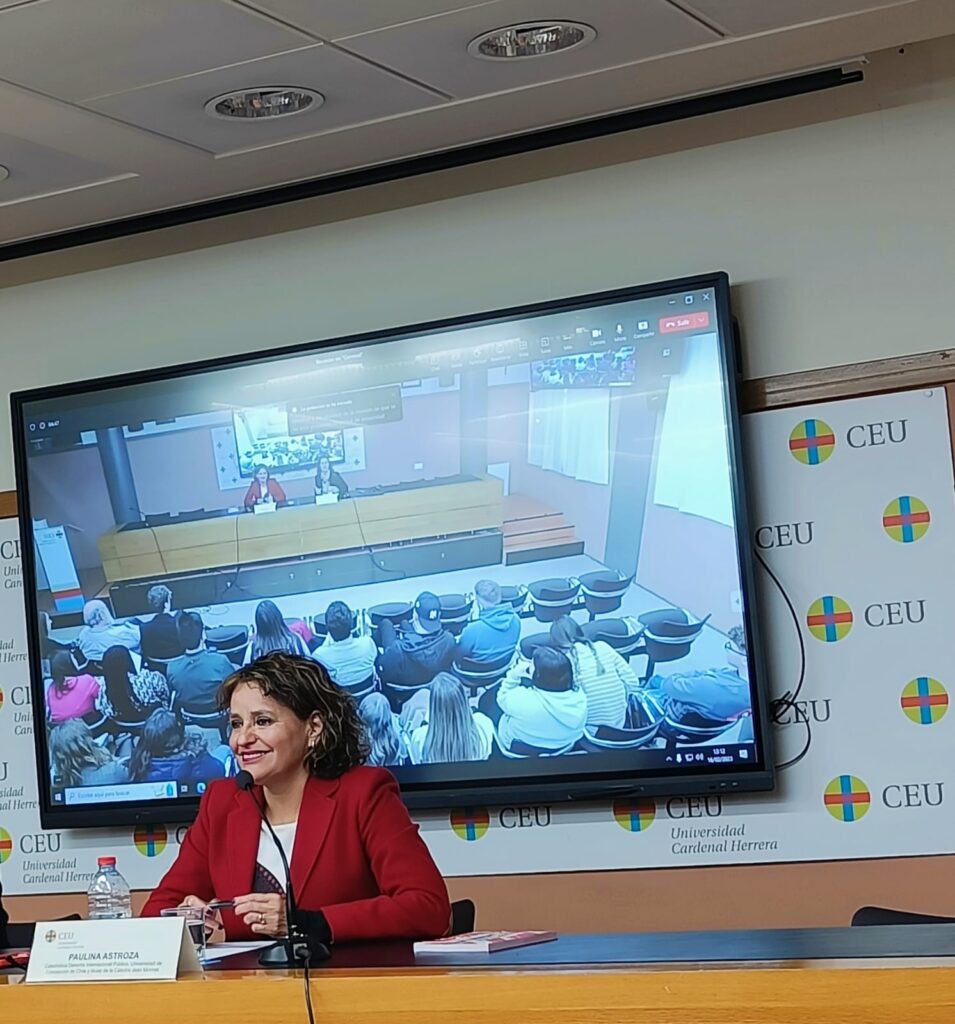
Despite these similarities, Paulina Astroza has mentioned those aspects that make them different:
1. Strong Institutions
Unlike Europe, Latin America lacks of strong institutions. However, Chile does have them and this was demonstrated after the social outbreak, the Covid-19 pandemic and every time there is a catastrophe (Chile is in the Top 10 countries at risk of climate change).
2. Integration
In Latin America there is no single integration project; there are more or less failed integration projects that overlap one another. “There is not one Latin America, but within it there are several Latin Americas. On the other hand, the European Union is a bloc and speaks with one voice.” Moreover, another problem that exists and hinders such integration is the discrepancy in interests among Latin American countries.
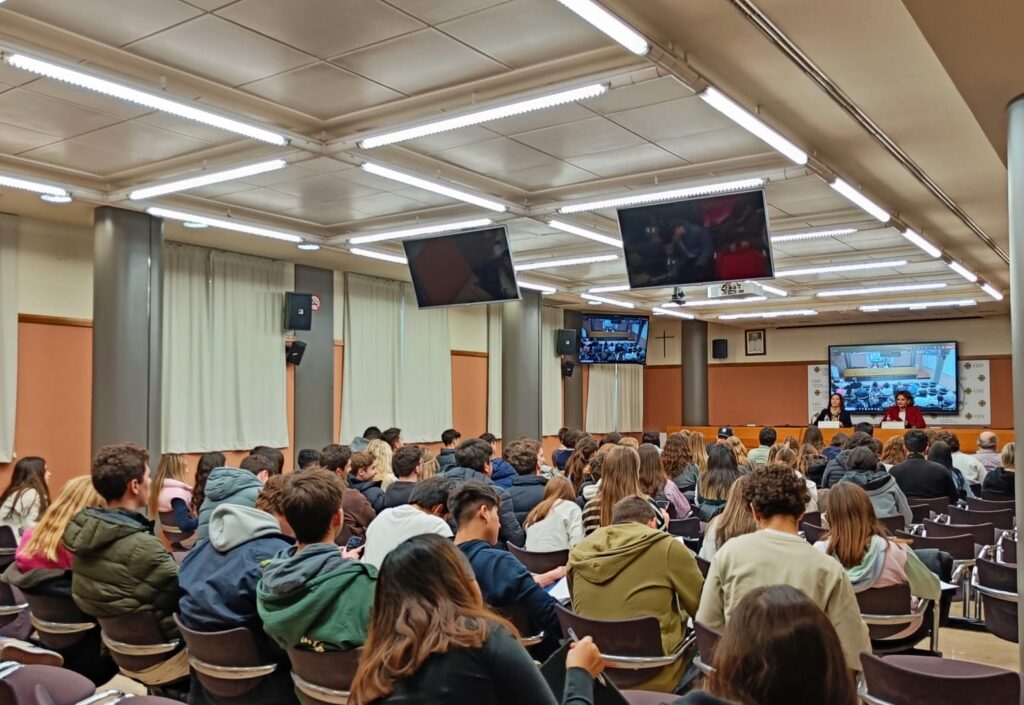
What are Europe’s challenges?
Finally, our guest has referred to the main threats facing Europe today. To this end, she has made a reference to the past, recalling that European integration was born out of a crisis, specifically the World Wars and especially the Second World War. However, she has stressed out that the European Union has been characterized by living through many crises and that Europeans have been able to emerge from each of these crises sooner or later.
According to Paulina Astroza, what has happened recently is that there has been in the world in general, but in Europe in particular, a concentration of crises that has generated greater tension both in European integration and within the states themselves. An example of this can be found in the financial crisis of 2008, from which the US emerged faster than Europe; in the refugee crisis of 2015; or in the crisis of identity and representation in the Euro-parliamentary elections.
In relation to this last crisis, “less and less people are voting, it has been in the last elections where the vote has increased a little more due to the fear of populism, but people are not voting, Europeans are not voting for their authorities. Moreover, their authorities, when they run in the Europarliamentary elections, talk about national politics, they do not even talk about Europe. That also makes people feel distanced from their own institutions“.
The key to this crisis lies in the crisis of representation at the national level, which is ultimately reflected in representation at the European level. According to the speaker, “what we are experiencing in the world today is precisely a problem of institutional crisis and representation“. Consequence of this are populisms, whose speeches raise easy solutions and emphasize certain issues that massively move the population, for example, the Brexit used immigration and blamed the European Union to leave the organization.
The speaker added that, currently, there is a lot of climate change denialism, denialism that freedom of expression has limits… “There is a whole revisionism that also plays against and that makes some parties and some movements have been increasing their votes.”
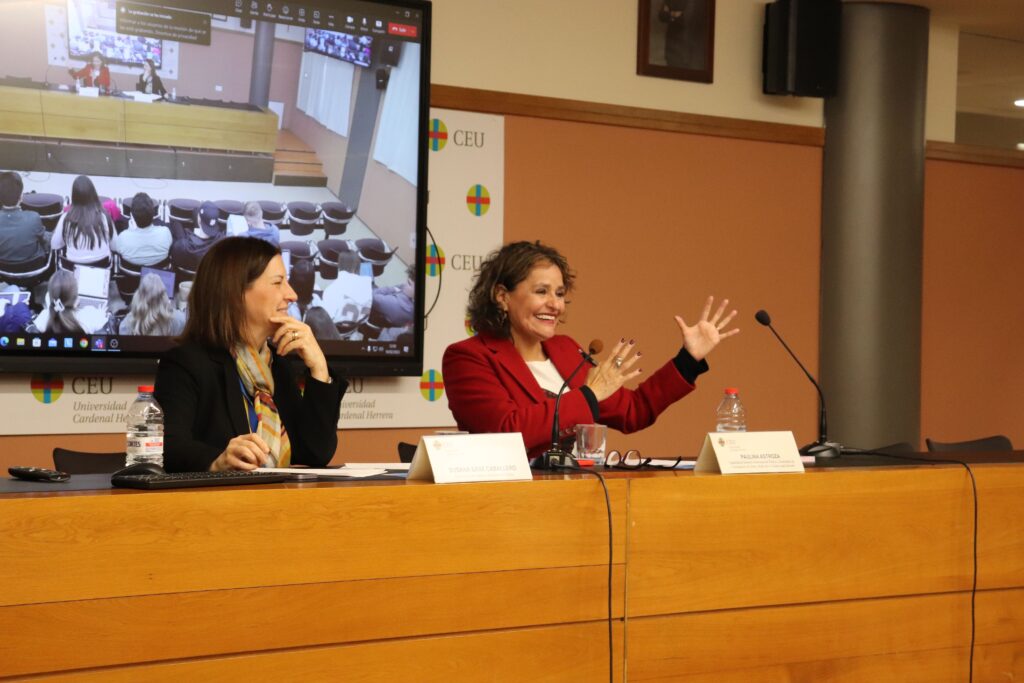
“PEOPLE ARE AFRAID, AND I THINK ESPECIALLY IN EUROPE MANY PEOPLE ARE AFRAID TO HAND OVER TO THEIR CHILDREN AND GRANDCHILDREN A EUROPE IN A WORSE SITUATION THAN THE ONE THEY RECEIVED FROM THEIR PARENTS BECAUSE OF THIS KIND OF THING”
Europe’s challenges are the energy issue, European integration and ensuring respect for the Rule of Law. Regarding the latter, Astroza recalled that the European Union foresees a sanction for those who violate Article 2 of the Treaty on European Union. In relation to countries that do not respect this fundamental principle of any democracy, the speaker used the expression of the “carrot and the stick” used in international relations: “if you want to behave well you get the carrot, if you want to behave badly you get the stick.”
Europe-Latin America relations
“The EU for a while forgot Latin America. We have never been a priority for Europe and so relations have been weakening for too long and this has allowed China to generate enormous influence.” Paulina Astroza has highlighted the importance of this 2023 in the relations between the European Union, Latin America and the Caribbean, partners that the European Union needs to recover to achieve the ecological transition given that countries such as Argentina, Bolivia and Chile have a huge concentration of lithium. She has also pointed out the relevance of Spain’s presidency of the European Council during the second half of the year in order to effectively achieve this rapprochement with Latin America.”
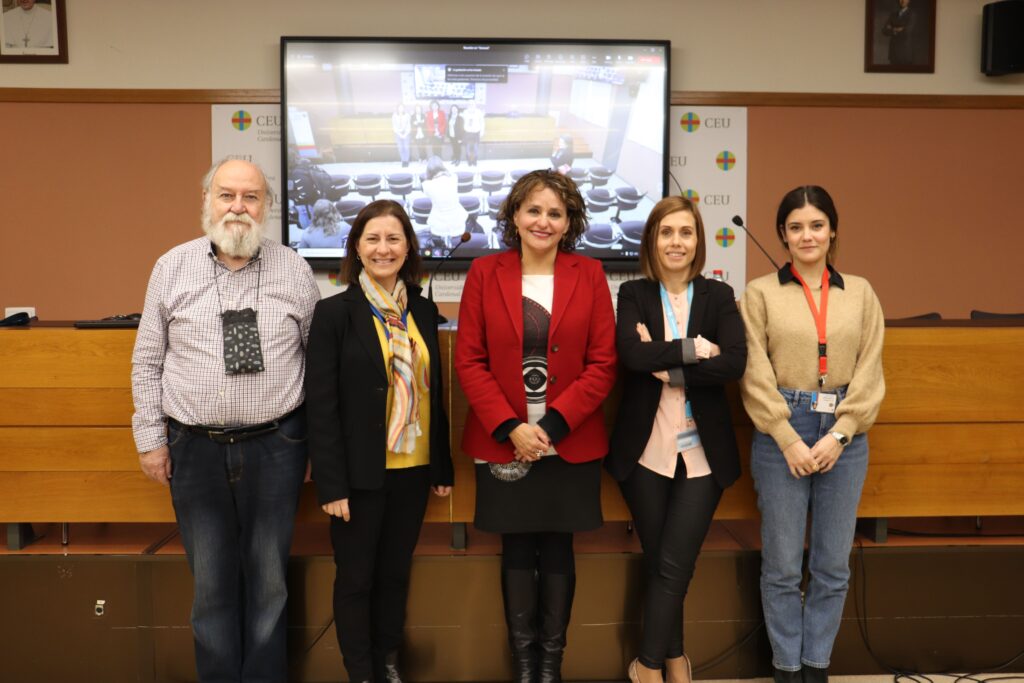
Paulina Astroza up close
During her time at CEU Cardenal Herrera University, we have had the opportunity to get to know Paulina Astroza‘s more personal side. Here is her interview.
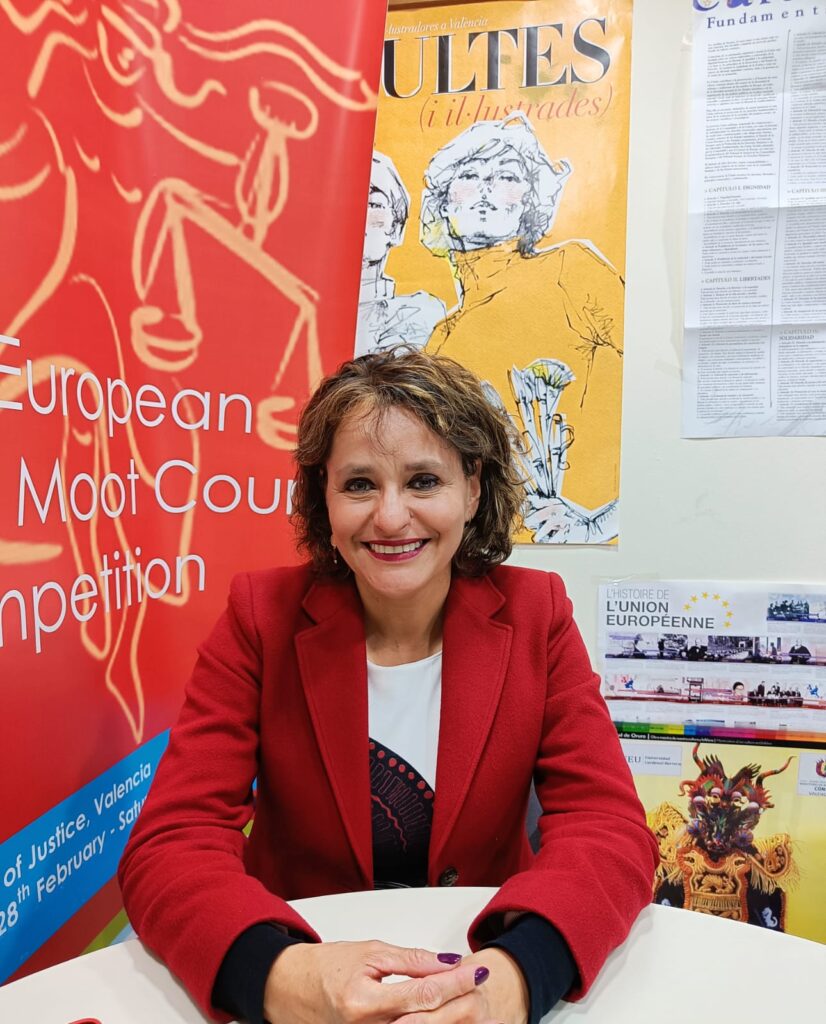
Q: You have an extensive international background, you completed your PhD studies at the University of Leuven in Belgium, one of the best ranked and recognized universities in Europe, with a long tradition of pioneering research. In addition, you have been part of the Chilean delegation to The Hague Cour. What would you highlight about these and other international experiences?
A: I have been at the Academy for 23 years since I entered the University and the truth is that I have managed, and this is what makes me very happy, to develop many projects beyond just teaching. Giving the same class for 23 years would have been very monotonous and I try to adapt it to the present, to take the cases that are happening at the moment.
If I had not developed a whole area with international projects, perhaps, some time ago I would have stopped being motivated by the Academy and, in that sense, on the one hand I have everything that means the projects that I have won in Jean Monnet, I have won 5 projects, a module, 2 projects and 2 Jean Monnet chairs, one of which is the one I currently have and I am in the first year. All the projects have been very rewarding because I have been able to team up with colleagues from different faculties of the University and with colleagues from other countries of origin, from Latin American and European countries.
I am always putting together different teams and that has allowed us to grow, I love it, I am one of the founders of the European Studies Program, which we created 20 years ago, and today we are Center for European studies, so thanks to the funding of these projects we have financed this program and we have been growing more and more.
In the end, all these projects have allowed me to generate networks and also from these networks I have been invited to other projects. So this snowball is growing and has also been favoring colleagues and especially students who have been on scholarships elsewhere. For me, it is very satisfying to see the diffusion of Europe, the creation of teams, and that I am not the only one who benefits, that is, that we share the benefits with a group of colleagues from Latin America, Europe, my own University and, above all, students.
I was part of the Advisory Council of the Ministry of Foreign Affairs with the claims of Bolivia against Chile before the International Court of Justice. It was also a very enriching experience because it is one thing to teach Public International Law from the classroom, to tell how the Court is, which is made up of 15 judges, the stages of a trial… But it is different to be in the Court, to see how the legal teams put together their strategy or the moment when the sentence is read, that also allows me when I come to class to explain the experience and that makes the students be more interested because I am telling them something very practical.
Q: We live in a multicultural world where people of different nationalities with different languages, customs, religions and beliefs coexist. Have you always had such a clear vocation for the intercultural world?
A: I always say that when I was a child, I was not afraid of the Cuckoo as we say in Chile or the bogeyman or the ghosts or the witch, I was afraid of the nuclear bomb. I always wondered why, somehow I was like Mafalda, Quino’s character, where did it come from? I don’t know.
From then on things happened, I never studied Law to become a court lawyer, that was always clear to me, I wanted to study Political Science, I liked all this at school, what was the theory of the State. I was doing very well in those subjects, the humanistic part, but there was no Political Science as an undergraduate in my time, so I knew and Ii was always clear to me that I wanted to come to study in Europe, learn another language and study Political Science and for that I needed a degree.
I started my academic career as a student assistant, then I became a collaborator, I came to Europe the first time between 1998 and 2000, in 2001 I returned to Chile and they hired me on a permanent basis and there I started to be a professor. Later my husband encouraged me to do my doctorate and we spent 4 years in Belgium, at the Faculty of Political Science of the University of Leuven. I chose the area of International Relations and finally I stayed in the international part and, above all, in the European area, but it was a path that I was fairly clear about. Partly it was planned, partly I let myself go and partly it was quite lucky.
I was there at the time and paths opened up for me, I got to know people, I have been reinforcing it and that has meant that I have been working in this field for 23 years now. All the countries I have traveled to, everything I have been able to do, teaching in other countries, students who have passed through my classrooms being awarded scholarships in other countries… It is very satisfying.
Q: You are native of Chillán, a city located in central Chile. How was the experience of living in Europe, specifically in Belgium? Did you appreciate the differences and similarities between the two cultures?
A: Chillán is a city located in the central-south zone of Chile and today, unfortunately, it is affected by forest fires. It is an agrarian city that is close to the mountain range, an hour and a half away from a ski center. It is a medium sized city that always had Concepción as its big brother and Concepción is the second city of Chile, after Santiago.
When I started my career I moved to Concepción and I never lived in Chillán again. My first international trip was in 1994, the first time I left Chile, and it was to New York. In 1997 with my husband we came to tour Europe and we spent the night in Leuven where a friend of a brother-in-law of mine hosted us, he was studying at the Faculty of Political Science but in the area of Public Administration. I said I was going to study in Leuven and that’s what I did.
There were things in common in many aspects, in reality we are from the most western side of life, it is not the same to go to Muslim countries, let’s say we are within this western world, but the difference was huge whether from Concepción to Chillán because in Chile only Spanish was spoken.
Nowadays, it is a product of the migrations that you meet Latin Americans from other countries, but at that time nothing and going to Belgium and to a University campus like Leuven where you meet people from all over the world, that is to say, having classmates from Iraq, Croatia, Russia, China, was a tremendous impact. Living in a university campus was super good from that point of view, what really depressed me a lot and it is a big difference, is that it was getting dark so early and it was terribly cold. That’s the only negative thing, we had such a great time, those were details. Then, from 2011 to 2015 we lived in Brussels. Belgium is amazing.
This multiculturalism was an experience you did not find in Chile, nowadays, globalization, migrations…Have made Chile not so homogeneous anymore.


